WS2121: History Autobiographical Reflective Journal Assignment
VerifiedAdded on 2022/08/26
|9
|2510
|25
Journal and Reflective Writing
AI Summary
This assignment presents a student's autobiographical reflective journal, focusing on their Indian history and culture in relation to the history of Australia. The student critically reflects on five journal entries, connecting their personal experiences and background to the course readings and key questions about colonization, Aboriginal history, and social work. The entries explore themes of racism, inequality, and the impact of colonization, drawing parallels between the experiences of Indigenous Australians and the student's own family history and cultural understanding. The student reflects on the challenges faced by Indigenous communities, the importance of cultural sensitivity, and the role of social work in addressing these issues. The assignment demonstrates the student's ability to analyze historical events and apply them to their personal narrative, highlighting the interconnectedness of history, culture, and social justice.
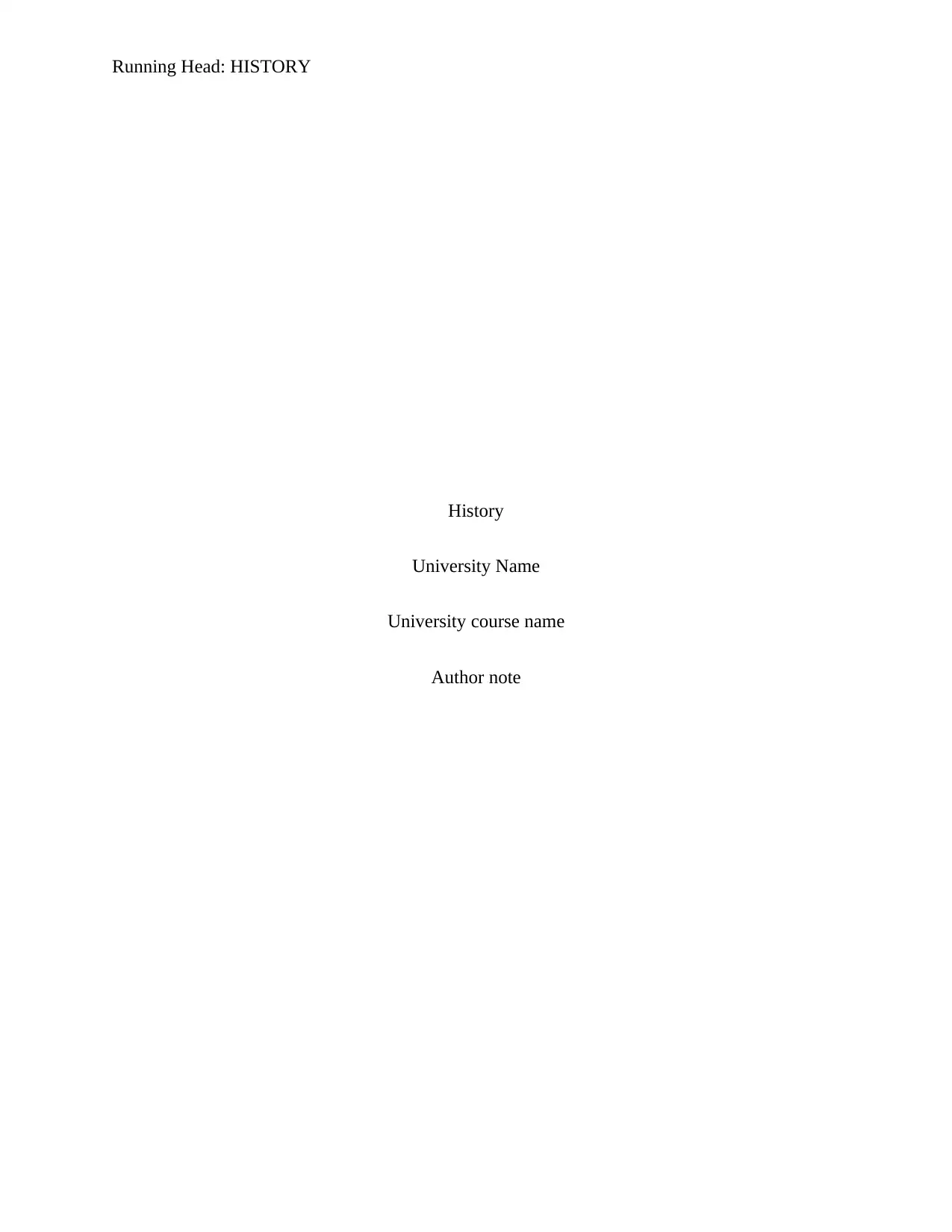
Running Head: HISTORY
History
University Name
University course name
Author note
History
University Name
University course name
Author note
Paraphrase This Document
Need a fresh take? Get an instant paraphrase of this document with our AI Paraphraser
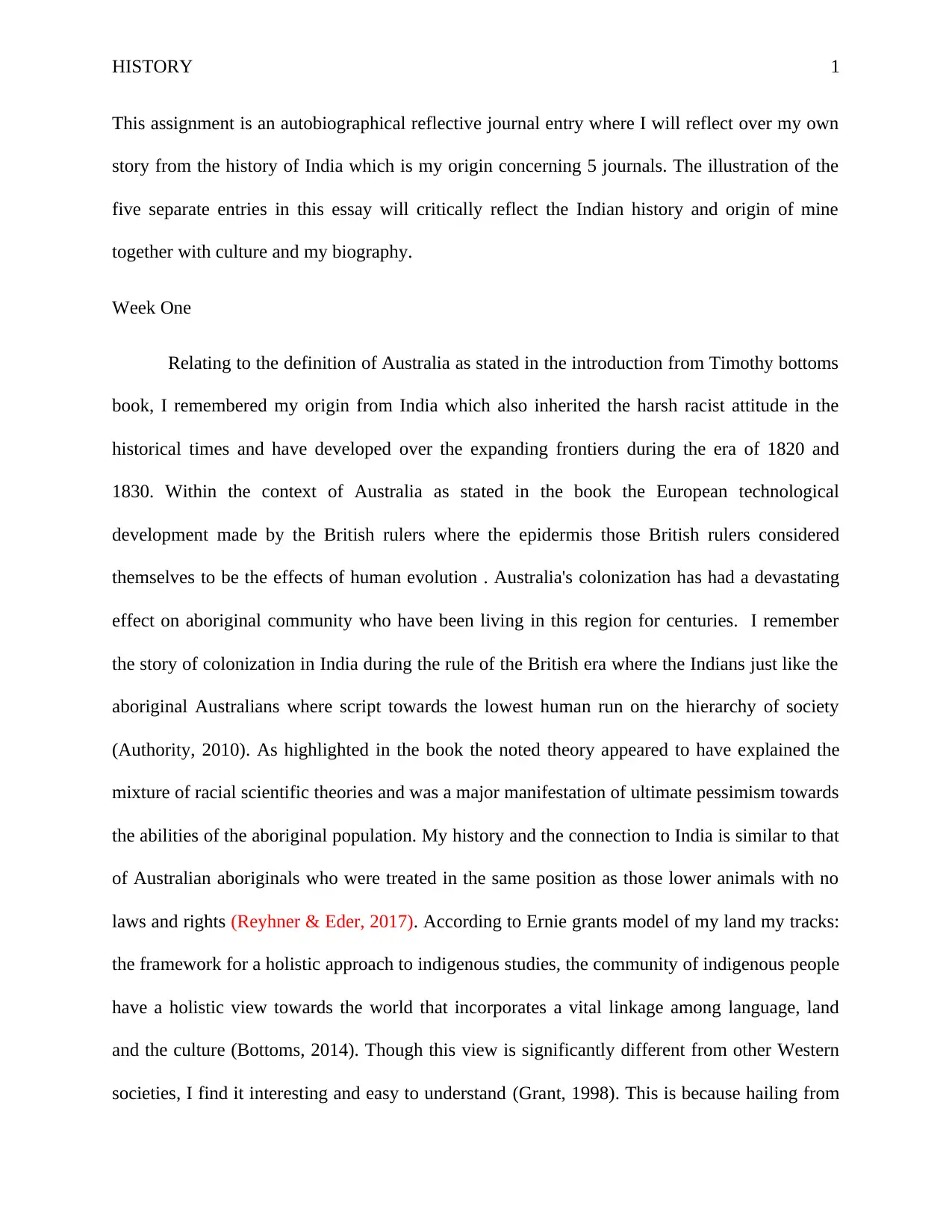
HISTORY 1
This assignment is an autobiographical reflective journal entry where I will reflect over my own
story from the history of India which is my origin concerning 5 journals. The illustration of the
five separate entries in this essay will critically reflect the Indian history and origin of mine
together with culture and my biography.
Week One
Relating to the definition of Australia as stated in the introduction from Timothy bottoms
book, I remembered my origin from India which also inherited the harsh racist attitude in the
historical times and have developed over the expanding frontiers during the era of 1820 and
1830. Within the context of Australia as stated in the book the European technological
development made by the British rulers where the epidermis those British rulers considered
themselves to be the effects of human evolution . Australia's colonization has had a devastating
effect on aboriginal community who have been living in this region for centuries. I remember
the story of colonization in India during the rule of the British era where the Indians just like the
aboriginal Australians where script towards the lowest human run on the hierarchy of society
(Authority, 2010). As highlighted in the book the noted theory appeared to have explained the
mixture of racial scientific theories and was a major manifestation of ultimate pessimism towards
the abilities of the aboriginal population. My history and the connection to India is similar to that
of Australian aboriginals who were treated in the same position as those lower animals with no
laws and rights (Reyhner & Eder, 2017). According to Ernie grants model of my land my tracks:
the framework for a holistic approach to indigenous studies, the community of indigenous people
have a holistic view towards the world that incorporates a vital linkage among language, land
and the culture (Bottoms, 2014). Though this view is significantly different from other Western
societies, I find it interesting and easy to understand (Grant, 1998). This is because hailing from
This assignment is an autobiographical reflective journal entry where I will reflect over my own
story from the history of India which is my origin concerning 5 journals. The illustration of the
five separate entries in this essay will critically reflect the Indian history and origin of mine
together with culture and my biography.
Week One
Relating to the definition of Australia as stated in the introduction from Timothy bottoms
book, I remembered my origin from India which also inherited the harsh racist attitude in the
historical times and have developed over the expanding frontiers during the era of 1820 and
1830. Within the context of Australia as stated in the book the European technological
development made by the British rulers where the epidermis those British rulers considered
themselves to be the effects of human evolution . Australia's colonization has had a devastating
effect on aboriginal community who have been living in this region for centuries. I remember
the story of colonization in India during the rule of the British era where the Indians just like the
aboriginal Australians where script towards the lowest human run on the hierarchy of society
(Authority, 2010). As highlighted in the book the noted theory appeared to have explained the
mixture of racial scientific theories and was a major manifestation of ultimate pessimism towards
the abilities of the aboriginal population. My history and the connection to India is similar to that
of Australian aboriginals who were treated in the same position as those lower animals with no
laws and rights (Reyhner & Eder, 2017). According to Ernie grants model of my land my tracks:
the framework for a holistic approach to indigenous studies, the community of indigenous people
have a holistic view towards the world that incorporates a vital linkage among language, land
and the culture (Bottoms, 2014). Though this view is significantly different from other Western
societies, I find it interesting and easy to understand (Grant, 1998). This is because hailing from
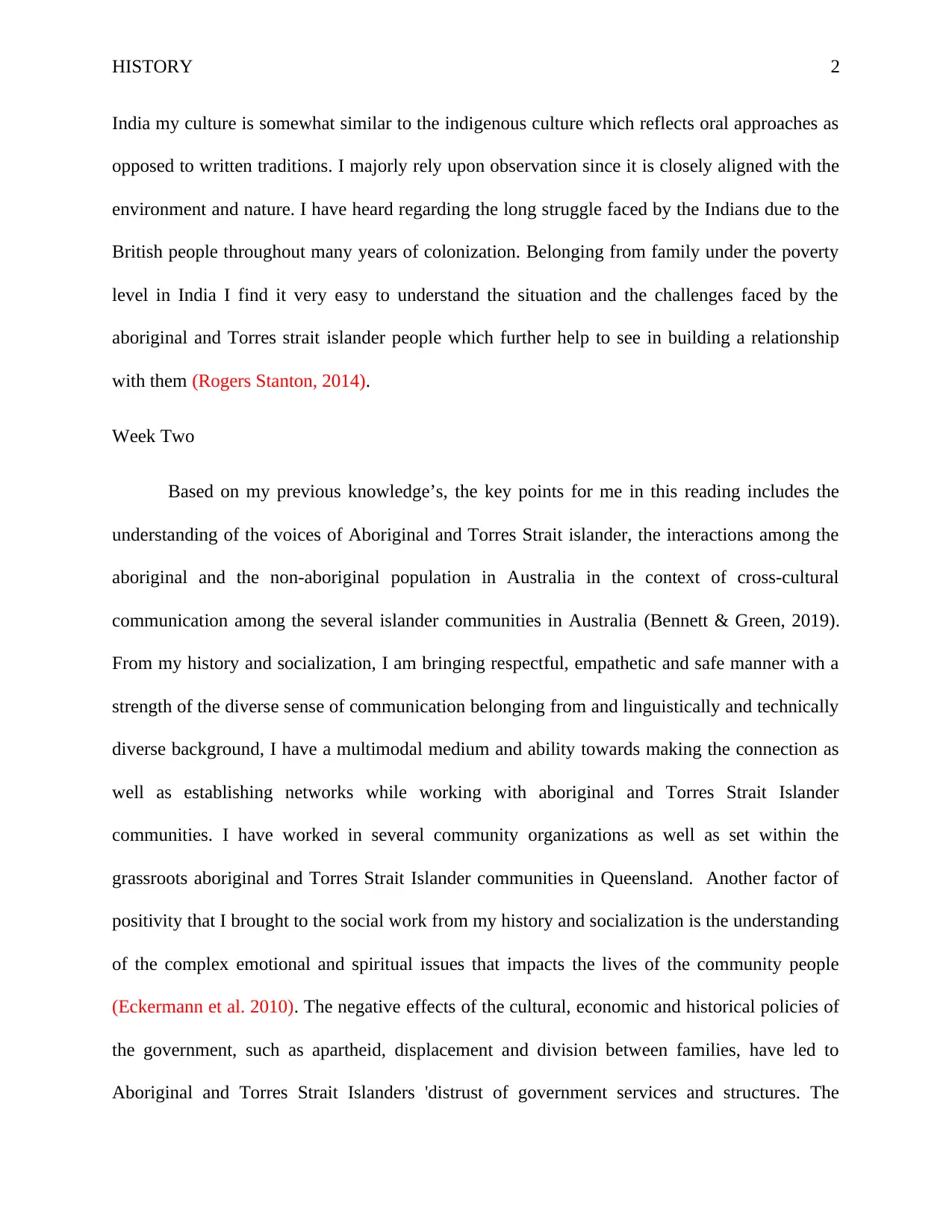
HISTORY 2
India my culture is somewhat similar to the indigenous culture which reflects oral approaches as
opposed to written traditions. I majorly rely upon observation since it is closely aligned with the
environment and nature. I have heard regarding the long struggle faced by the Indians due to the
British people throughout many years of colonization. Belonging from family under the poverty
level in India I find it very easy to understand the situation and the challenges faced by the
aboriginal and Torres strait islander people which further help to see in building a relationship
with them (Rogers Stanton, 2014).
Week Two
Based on my previous knowledge’s, the key points for me in this reading includes the
understanding of the voices of Aboriginal and Torres Strait islander, the interactions among the
aboriginal and the non-aboriginal population in Australia in the context of cross-cultural
communication among the several islander communities in Australia (Bennett & Green, 2019).
From my history and socialization, I am bringing respectful, empathetic and safe manner with a
strength of the diverse sense of communication belonging from and linguistically and technically
diverse background, I have a multimodal medium and ability towards making the connection as
well as establishing networks while working with aboriginal and Torres Strait Islander
communities. I have worked in several community organizations as well as set within the
grassroots aboriginal and Torres Strait Islander communities in Queensland. Another factor of
positivity that I brought to the social work from my history and socialization is the understanding
of the complex emotional and spiritual issues that impacts the lives of the community people
(Eckermann et al. 2010). The negative effects of the cultural, economic and historical policies of
the government, such as apartheid, displacement and division between families, have led to
Aboriginal and Torres Strait Islanders 'distrust of government services and structures. The
India my culture is somewhat similar to the indigenous culture which reflects oral approaches as
opposed to written traditions. I majorly rely upon observation since it is closely aligned with the
environment and nature. I have heard regarding the long struggle faced by the Indians due to the
British people throughout many years of colonization. Belonging from family under the poverty
level in India I find it very easy to understand the situation and the challenges faced by the
aboriginal and Torres strait islander people which further help to see in building a relationship
with them (Rogers Stanton, 2014).
Week Two
Based on my previous knowledge’s, the key points for me in this reading includes the
understanding of the voices of Aboriginal and Torres Strait islander, the interactions among the
aboriginal and the non-aboriginal population in Australia in the context of cross-cultural
communication among the several islander communities in Australia (Bennett & Green, 2019).
From my history and socialization, I am bringing respectful, empathetic and safe manner with a
strength of the diverse sense of communication belonging from and linguistically and technically
diverse background, I have a multimodal medium and ability towards making the connection as
well as establishing networks while working with aboriginal and Torres Strait Islander
communities. I have worked in several community organizations as well as set within the
grassroots aboriginal and Torres Strait Islander communities in Queensland. Another factor of
positivity that I brought to the social work from my history and socialization is the understanding
of the complex emotional and spiritual issues that impacts the lives of the community people
(Eckermann et al. 2010). The negative effects of the cultural, economic and historical policies of
the government, such as apartheid, displacement and division between families, have led to
Aboriginal and Torres Strait Islanders 'distrust of government services and structures. The
⊘ This is a preview!⊘
Do you want full access?
Subscribe today to unlock all pages.

Trusted by 1+ million students worldwide
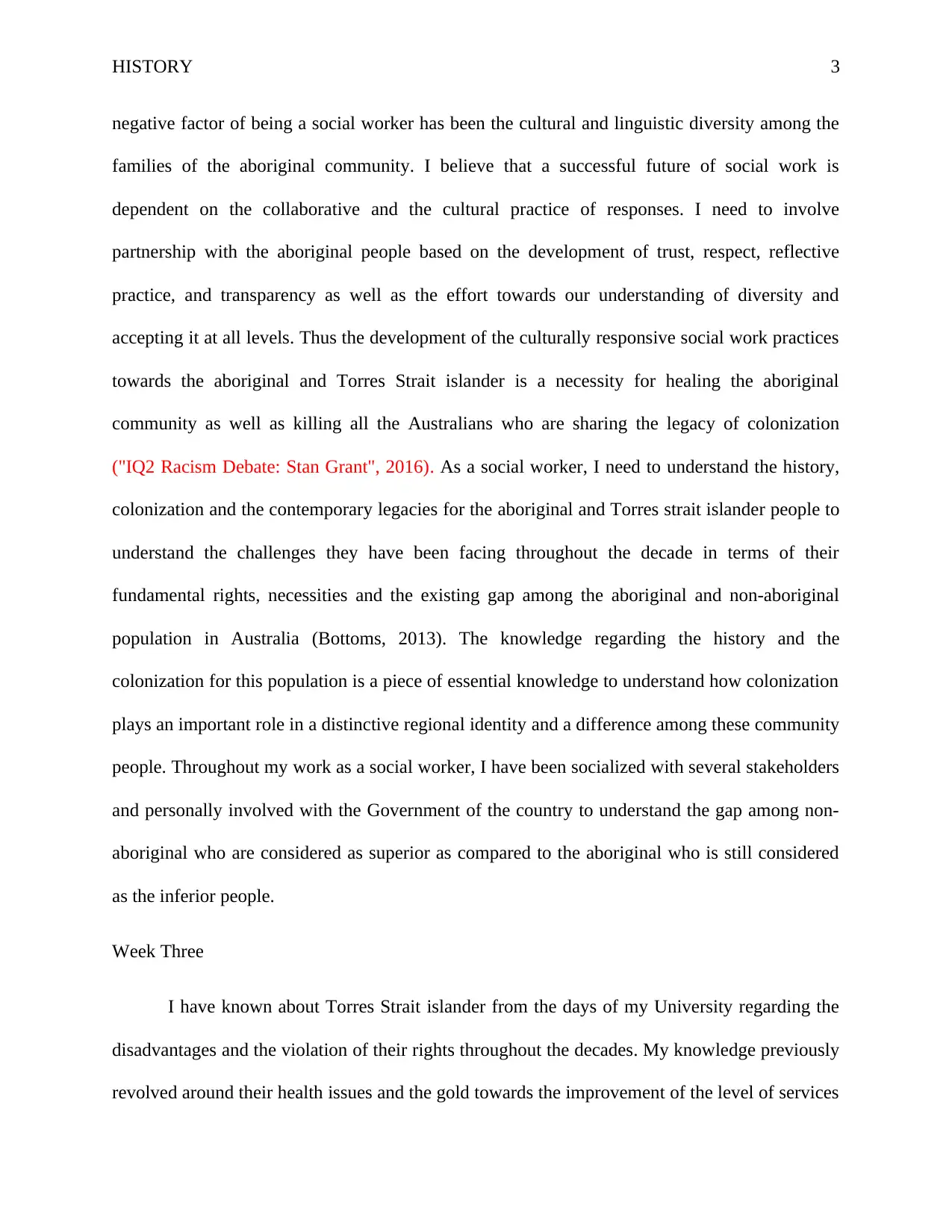
HISTORY 3
negative factor of being a social worker has been the cultural and linguistic diversity among the
families of the aboriginal community. I believe that a successful future of social work is
dependent on the collaborative and the cultural practice of responses. I need to involve
partnership with the aboriginal people based on the development of trust, respect, reflective
practice, and transparency as well as the effort towards our understanding of diversity and
accepting it at all levels. Thus the development of the culturally responsive social work practices
towards the aboriginal and Torres Strait islander is a necessity for healing the aboriginal
community as well as killing all the Australians who are sharing the legacy of colonization
("IQ2 Racism Debate: Stan Grant", 2016). As a social worker, I need to understand the history,
colonization and the contemporary legacies for the aboriginal and Torres strait islander people to
understand the challenges they have been facing throughout the decade in terms of their
fundamental rights, necessities and the existing gap among the aboriginal and non-aboriginal
population in Australia (Bottoms, 2013). The knowledge regarding the history and the
colonization for this population is a piece of essential knowledge to understand how colonization
plays an important role in a distinctive regional identity and a difference among these community
people. Throughout my work as a social worker, I have been socialized with several stakeholders
and personally involved with the Government of the country to understand the gap among non-
aboriginal who are considered as superior as compared to the aboriginal who is still considered
as the inferior people.
Week Three
I have known about Torres Strait islander from the days of my University regarding the
disadvantages and the violation of their rights throughout the decades. My knowledge previously
revolved around their health issues and the gold towards the improvement of the level of services
negative factor of being a social worker has been the cultural and linguistic diversity among the
families of the aboriginal community. I believe that a successful future of social work is
dependent on the collaborative and the cultural practice of responses. I need to involve
partnership with the aboriginal people based on the development of trust, respect, reflective
practice, and transparency as well as the effort towards our understanding of diversity and
accepting it at all levels. Thus the development of the culturally responsive social work practices
towards the aboriginal and Torres Strait islander is a necessity for healing the aboriginal
community as well as killing all the Australians who are sharing the legacy of colonization
("IQ2 Racism Debate: Stan Grant", 2016). As a social worker, I need to understand the history,
colonization and the contemporary legacies for the aboriginal and Torres strait islander people to
understand the challenges they have been facing throughout the decade in terms of their
fundamental rights, necessities and the existing gap among the aboriginal and non-aboriginal
population in Australia (Bottoms, 2013). The knowledge regarding the history and the
colonization for this population is a piece of essential knowledge to understand how colonization
plays an important role in a distinctive regional identity and a difference among these community
people. Throughout my work as a social worker, I have been socialized with several stakeholders
and personally involved with the Government of the country to understand the gap among non-
aboriginal who are considered as superior as compared to the aboriginal who is still considered
as the inferior people.
Week Three
I have known about Torres Strait islander from the days of my University regarding the
disadvantages and the violation of their rights throughout the decades. My knowledge previously
revolved around their health issues and the gold towards the improvement of the level of services
Paraphrase This Document
Need a fresh take? Get an instant paraphrase of this document with our AI Paraphraser
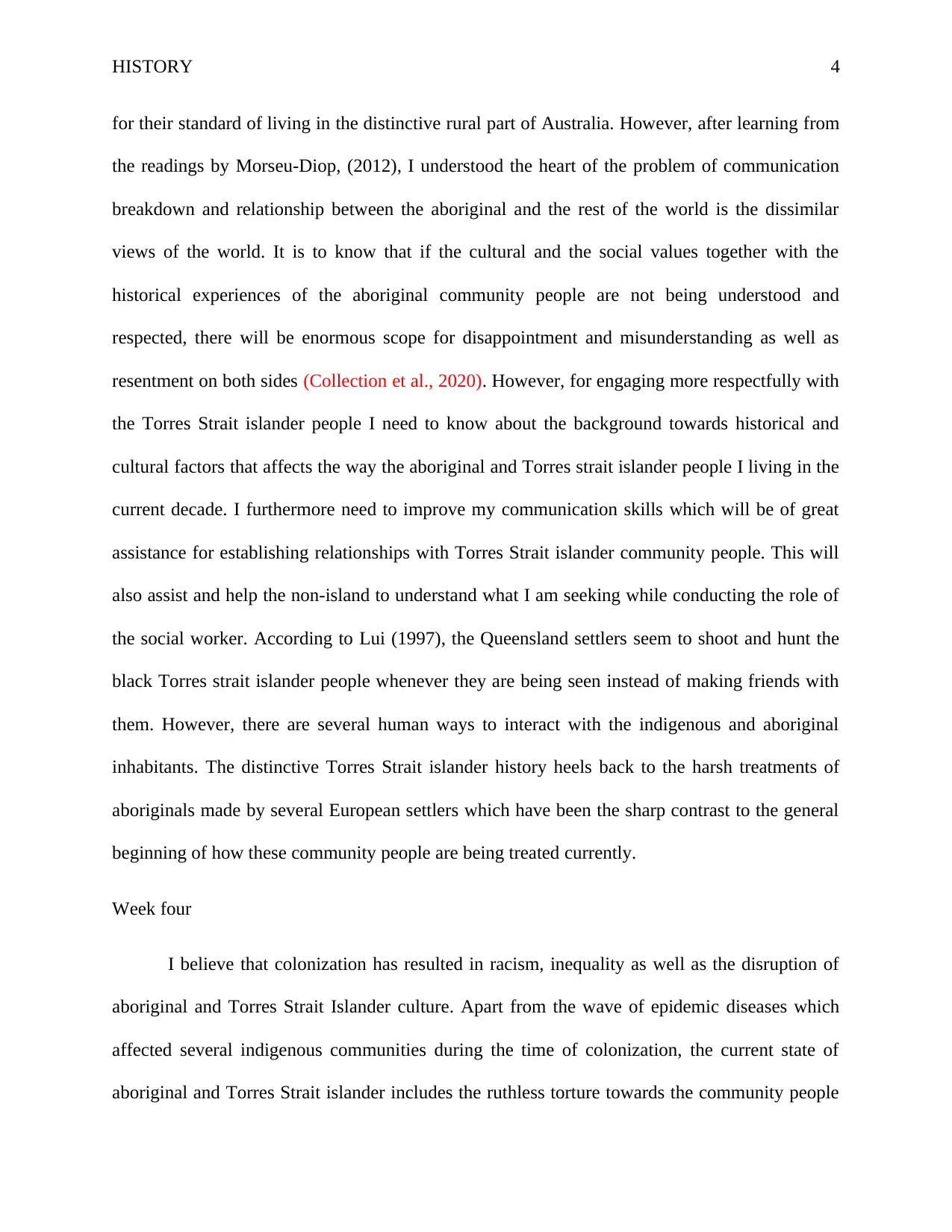
HISTORY 4
for their standard of living in the distinctive rural part of Australia. However, after learning from
the readings by Morseu-Diop, (2012), I understood the heart of the problem of communication
breakdown and relationship between the aboriginal and the rest of the world is the dissimilar
views of the world. It is to know that if the cultural and the social values together with the
historical experiences of the aboriginal community people are not being understood and
respected, there will be enormous scope for disappointment and misunderstanding as well as
resentment on both sides (Collection et al., 2020). However, for engaging more respectfully with
the Torres Strait islander people I need to know about the background towards historical and
cultural factors that affects the way the aboriginal and Torres strait islander people I living in the
current decade. I furthermore need to improve my communication skills which will be of great
assistance for establishing relationships with Torres Strait islander community people. This will
also assist and help the non-island to understand what I am seeking while conducting the role of
the social worker. According to Lui (1997), the Queensland settlers seem to shoot and hunt the
black Torres strait islander people whenever they are being seen instead of making friends with
them. However, there are several human ways to interact with the indigenous and aboriginal
inhabitants. The distinctive Torres Strait islander history heels back to the harsh treatments of
aboriginals made by several European settlers which have been the sharp contrast to the general
beginning of how these community people are being treated currently.
Week four
I believe that colonization has resulted in racism, inequality as well as the disruption of
aboriginal and Torres Strait Islander culture. Apart from the wave of epidemic diseases which
affected several indigenous communities during the time of colonization, the current state of
aboriginal and Torres Strait islander includes the ruthless torture towards the community people
for their standard of living in the distinctive rural part of Australia. However, after learning from
the readings by Morseu-Diop, (2012), I understood the heart of the problem of communication
breakdown and relationship between the aboriginal and the rest of the world is the dissimilar
views of the world. It is to know that if the cultural and the social values together with the
historical experiences of the aboriginal community people are not being understood and
respected, there will be enormous scope for disappointment and misunderstanding as well as
resentment on both sides (Collection et al., 2020). However, for engaging more respectfully with
the Torres Strait islander people I need to know about the background towards historical and
cultural factors that affects the way the aboriginal and Torres strait islander people I living in the
current decade. I furthermore need to improve my communication skills which will be of great
assistance for establishing relationships with Torres Strait islander community people. This will
also assist and help the non-island to understand what I am seeking while conducting the role of
the social worker. According to Lui (1997), the Queensland settlers seem to shoot and hunt the
black Torres strait islander people whenever they are being seen instead of making friends with
them. However, there are several human ways to interact with the indigenous and aboriginal
inhabitants. The distinctive Torres Strait islander history heels back to the harsh treatments of
aboriginals made by several European settlers which have been the sharp contrast to the general
beginning of how these community people are being treated currently.
Week four
I believe that colonization has resulted in racism, inequality as well as the disruption of
aboriginal and Torres Strait Islander culture. Apart from the wave of epidemic diseases which
affected several indigenous communities during the time of colonization, the current state of
aboriginal and Torres Strait islander includes the ruthless torture towards the community people
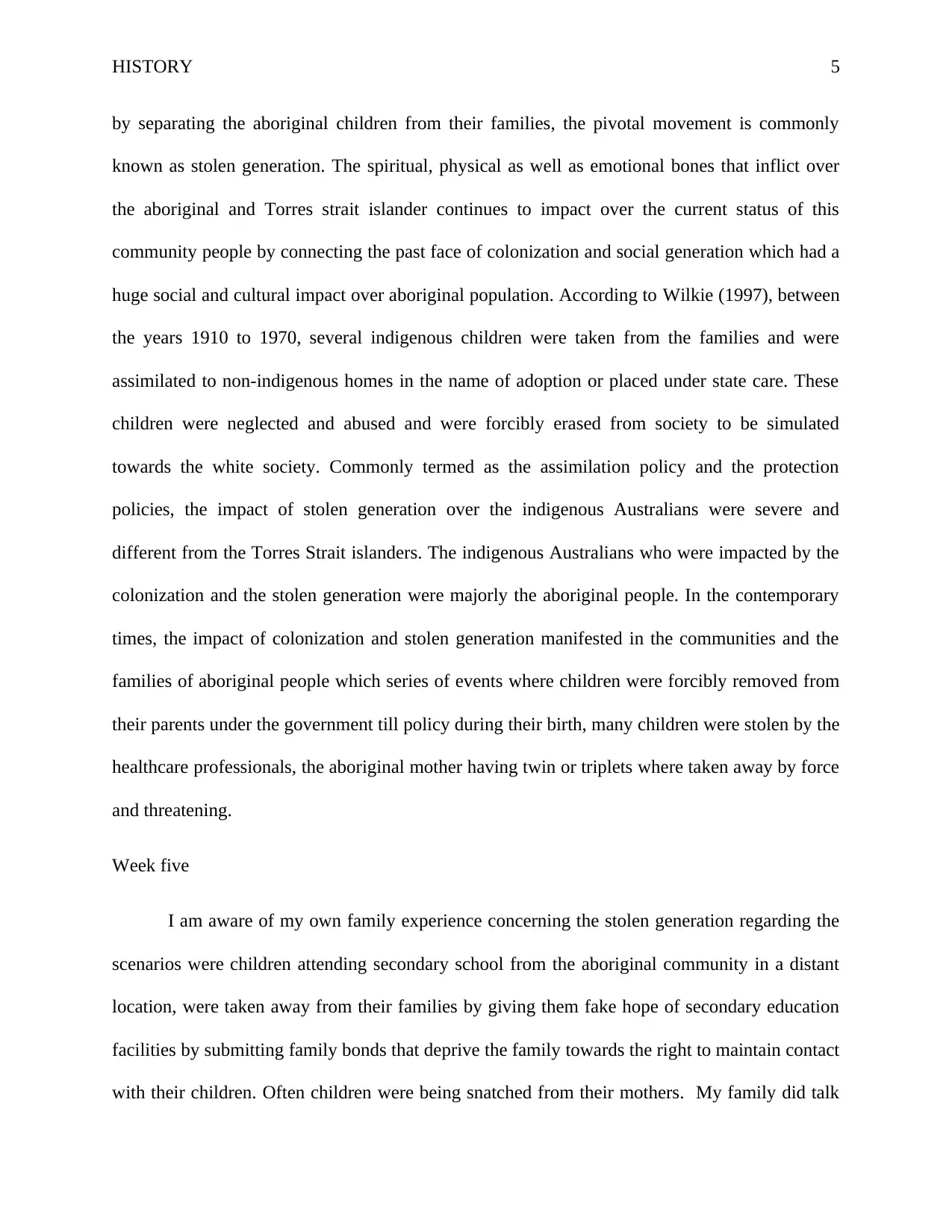
HISTORY 5
by separating the aboriginal children from their families, the pivotal movement is commonly
known as stolen generation. The spiritual, physical as well as emotional bones that inflict over
the aboriginal and Torres strait islander continues to impact over the current status of this
community people by connecting the past face of colonization and social generation which had a
huge social and cultural impact over aboriginal population. According to Wilkie (1997), between
the years 1910 to 1970, several indigenous children were taken from the families and were
assimilated to non-indigenous homes in the name of adoption or placed under state care. These
children were neglected and abused and were forcibly erased from society to be simulated
towards the white society. Commonly termed as the assimilation policy and the protection
policies, the impact of stolen generation over the indigenous Australians were severe and
different from the Torres Strait islanders. The indigenous Australians who were impacted by the
colonization and the stolen generation were majorly the aboriginal people. In the contemporary
times, the impact of colonization and stolen generation manifested in the communities and the
families of aboriginal people which series of events where children were forcibly removed from
their parents under the government till policy during their birth, many children were stolen by the
healthcare professionals, the aboriginal mother having twin or triplets where taken away by force
and threatening.
Week five
I am aware of my own family experience concerning the stolen generation regarding the
scenarios were children attending secondary school from the aboriginal community in a distant
location, were taken away from their families by giving them fake hope of secondary education
facilities by submitting family bonds that deprive the family towards the right to maintain contact
with their children. Often children were being snatched from their mothers. My family did talk
by separating the aboriginal children from their families, the pivotal movement is commonly
known as stolen generation. The spiritual, physical as well as emotional bones that inflict over
the aboriginal and Torres strait islander continues to impact over the current status of this
community people by connecting the past face of colonization and social generation which had a
huge social and cultural impact over aboriginal population. According to Wilkie (1997), between
the years 1910 to 1970, several indigenous children were taken from the families and were
assimilated to non-indigenous homes in the name of adoption or placed under state care. These
children were neglected and abused and were forcibly erased from society to be simulated
towards the white society. Commonly termed as the assimilation policy and the protection
policies, the impact of stolen generation over the indigenous Australians were severe and
different from the Torres Strait islanders. The indigenous Australians who were impacted by the
colonization and the stolen generation were majorly the aboriginal people. In the contemporary
times, the impact of colonization and stolen generation manifested in the communities and the
families of aboriginal people which series of events where children were forcibly removed from
their parents under the government till policy during their birth, many children were stolen by the
healthcare professionals, the aboriginal mother having twin or triplets where taken away by force
and threatening.
Week five
I am aware of my own family experience concerning the stolen generation regarding the
scenarios were children attending secondary school from the aboriginal community in a distant
location, were taken away from their families by giving them fake hope of secondary education
facilities by submitting family bonds that deprive the family towards the right to maintain contact
with their children. Often children were being snatched from their mothers. My family did talk
⊘ This is a preview!⊘
Do you want full access?
Subscribe today to unlock all pages.

Trusted by 1+ million students worldwide
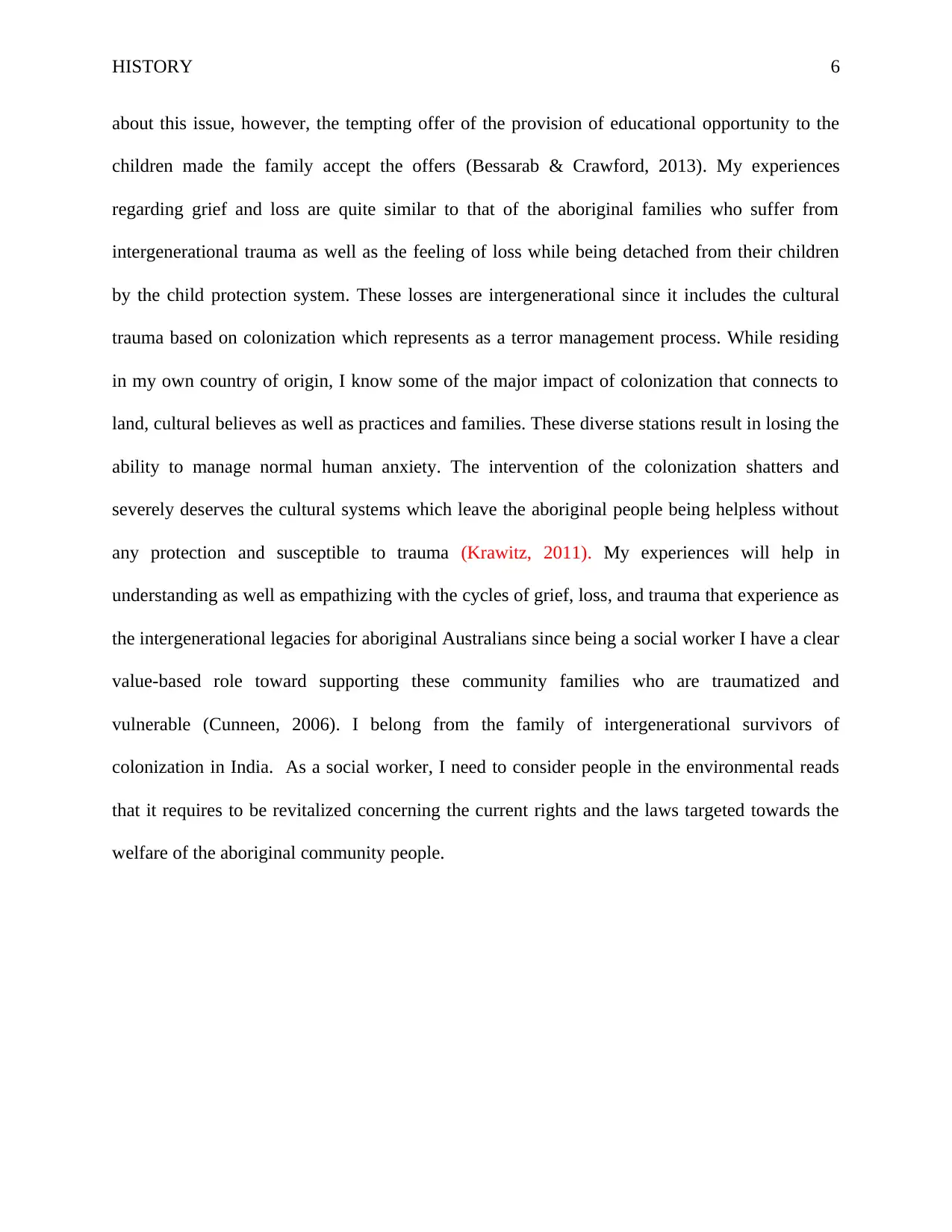
HISTORY 6
about this issue, however, the tempting offer of the provision of educational opportunity to the
children made the family accept the offers (Bessarab & Crawford, 2013). My experiences
regarding grief and loss are quite similar to that of the aboriginal families who suffer from
intergenerational trauma as well as the feeling of loss while being detached from their children
by the child protection system. These losses are intergenerational since it includes the cultural
trauma based on colonization which represents as a terror management process. While residing
in my own country of origin, I know some of the major impact of colonization that connects to
land, cultural believes as well as practices and families. These diverse stations result in losing the
ability to manage normal human anxiety. The intervention of the colonization shatters and
severely deserves the cultural systems which leave the aboriginal people being helpless without
any protection and susceptible to trauma (Krawitz, 2011). My experiences will help in
understanding as well as empathizing with the cycles of grief, loss, and trauma that experience as
the intergenerational legacies for aboriginal Australians since being a social worker I have a clear
value-based role toward supporting these community families who are traumatized and
vulnerable (Cunneen, 2006). I belong from the family of intergenerational survivors of
colonization in India. As a social worker, I need to consider people in the environmental reads
that it requires to be revitalized concerning the current rights and the laws targeted towards the
welfare of the aboriginal community people.
about this issue, however, the tempting offer of the provision of educational opportunity to the
children made the family accept the offers (Bessarab & Crawford, 2013). My experiences
regarding grief and loss are quite similar to that of the aboriginal families who suffer from
intergenerational trauma as well as the feeling of loss while being detached from their children
by the child protection system. These losses are intergenerational since it includes the cultural
trauma based on colonization which represents as a terror management process. While residing
in my own country of origin, I know some of the major impact of colonization that connects to
land, cultural believes as well as practices and families. These diverse stations result in losing the
ability to manage normal human anxiety. The intervention of the colonization shatters and
severely deserves the cultural systems which leave the aboriginal people being helpless without
any protection and susceptible to trauma (Krawitz, 2011). My experiences will help in
understanding as well as empathizing with the cycles of grief, loss, and trauma that experience as
the intergenerational legacies for aboriginal Australians since being a social worker I have a clear
value-based role toward supporting these community families who are traumatized and
vulnerable (Cunneen, 2006). I belong from the family of intergenerational survivors of
colonization in India. As a social worker, I need to consider people in the environmental reads
that it requires to be revitalized concerning the current rights and the laws targeted towards the
welfare of the aboriginal community people.
Paraphrase This Document
Need a fresh take? Get an instant paraphrase of this document with our AI Paraphraser
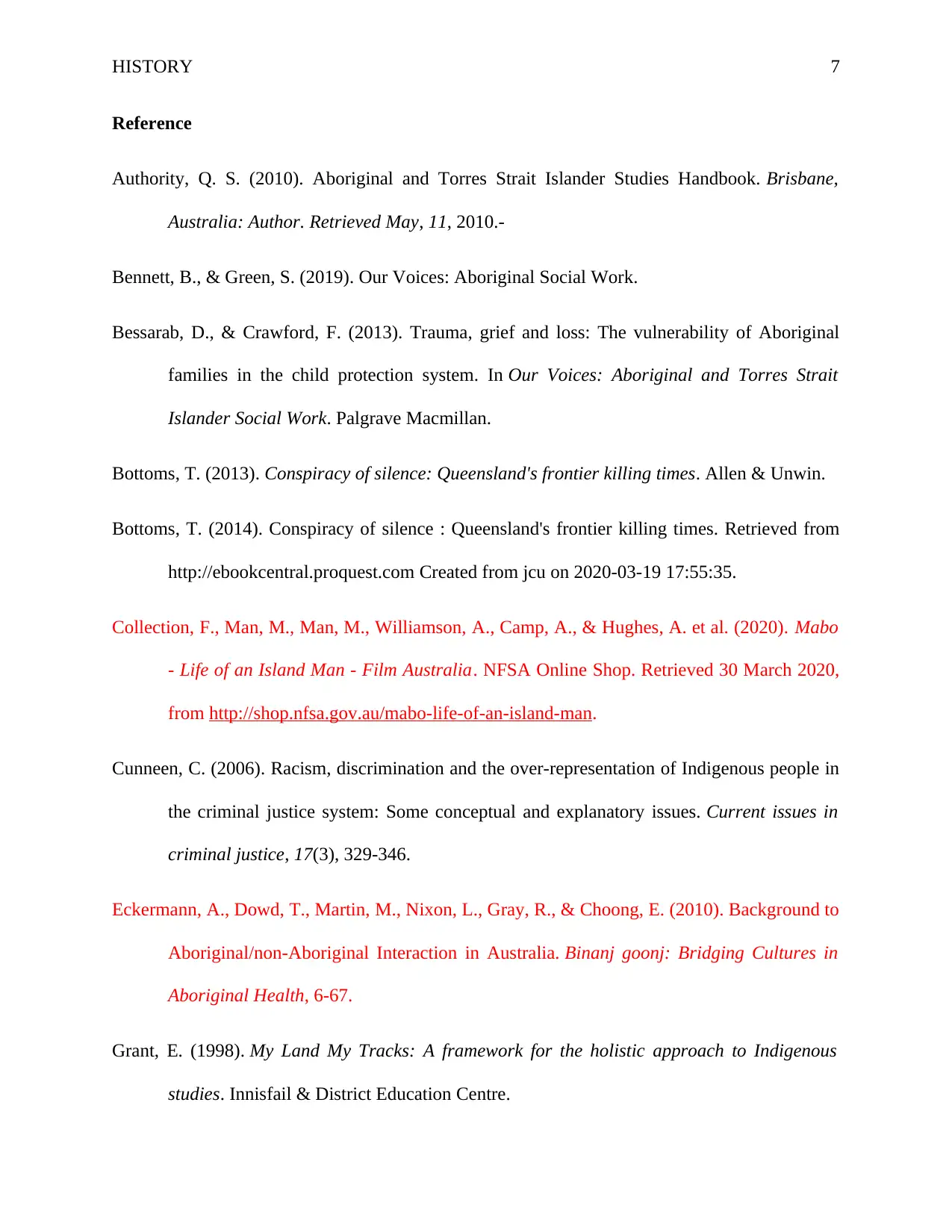
HISTORY 7
Reference
Authority, Q. S. (2010). Aboriginal and Torres Strait Islander Studies Handbook. Brisbane,
Australia: Author. Retrieved May, 11, 2010.-
Bennett, B., & Green, S. (2019). Our Voices: Aboriginal Social Work.
Bessarab, D., & Crawford, F. (2013). Trauma, grief and loss: The vulnerability of Aboriginal
families in the child protection system. In Our Voices: Aboriginal and Torres Strait
Islander Social Work. Palgrave Macmillan.
Bottoms, T. (2013). Conspiracy of silence: Queensland's frontier killing times. Allen & Unwin.
Bottoms, T. (2014). Conspiracy of silence : Queensland's frontier killing times. Retrieved from
http://ebookcentral.proquest.com Created from jcu on 2020-03-19 17:55:35.
Collection, F., Man, M., Man, M., Williamson, A., Camp, A., & Hughes, A. et al. (2020). Mabo
- Life of an Island Man - Film Australia. NFSA Online Shop. Retrieved 30 March 2020,
from http://shop.nfsa.gov.au/mabo-life-of-an-island-man.
Cunneen, C. (2006). Racism, discrimination and the over-representation of Indigenous people in
the criminal justice system: Some conceptual and explanatory issues. Current issues in
criminal justice, 17(3), 329-346.
Eckermann, A., Dowd, T., Martin, M., Nixon, L., Gray, R., & Choong, E. (2010). Background to
Aboriginal/non-Aboriginal Interaction in Australia. Binanj goonj: Bridging Cultures in
Aboriginal Health, 6-67.
Grant, E. (1998). My Land My Tracks: A framework for the holistic approach to Indigenous
studies. Innisfail & District Education Centre.
Reference
Authority, Q. S. (2010). Aboriginal and Torres Strait Islander Studies Handbook. Brisbane,
Australia: Author. Retrieved May, 11, 2010.-
Bennett, B., & Green, S. (2019). Our Voices: Aboriginal Social Work.
Bessarab, D., & Crawford, F. (2013). Trauma, grief and loss: The vulnerability of Aboriginal
families in the child protection system. In Our Voices: Aboriginal and Torres Strait
Islander Social Work. Palgrave Macmillan.
Bottoms, T. (2013). Conspiracy of silence: Queensland's frontier killing times. Allen & Unwin.
Bottoms, T. (2014). Conspiracy of silence : Queensland's frontier killing times. Retrieved from
http://ebookcentral.proquest.com Created from jcu on 2020-03-19 17:55:35.
Collection, F., Man, M., Man, M., Williamson, A., Camp, A., & Hughes, A. et al. (2020). Mabo
- Life of an Island Man - Film Australia. NFSA Online Shop. Retrieved 30 March 2020,
from http://shop.nfsa.gov.au/mabo-life-of-an-island-man.
Cunneen, C. (2006). Racism, discrimination and the over-representation of Indigenous people in
the criminal justice system: Some conceptual and explanatory issues. Current issues in
criminal justice, 17(3), 329-346.
Eckermann, A., Dowd, T., Martin, M., Nixon, L., Gray, R., & Choong, E. (2010). Background to
Aboriginal/non-Aboriginal Interaction in Australia. Binanj goonj: Bridging Cultures in
Aboriginal Health, 6-67.
Grant, E. (1998). My Land My Tracks: A framework for the holistic approach to Indigenous
studies. Innisfail & District Education Centre.
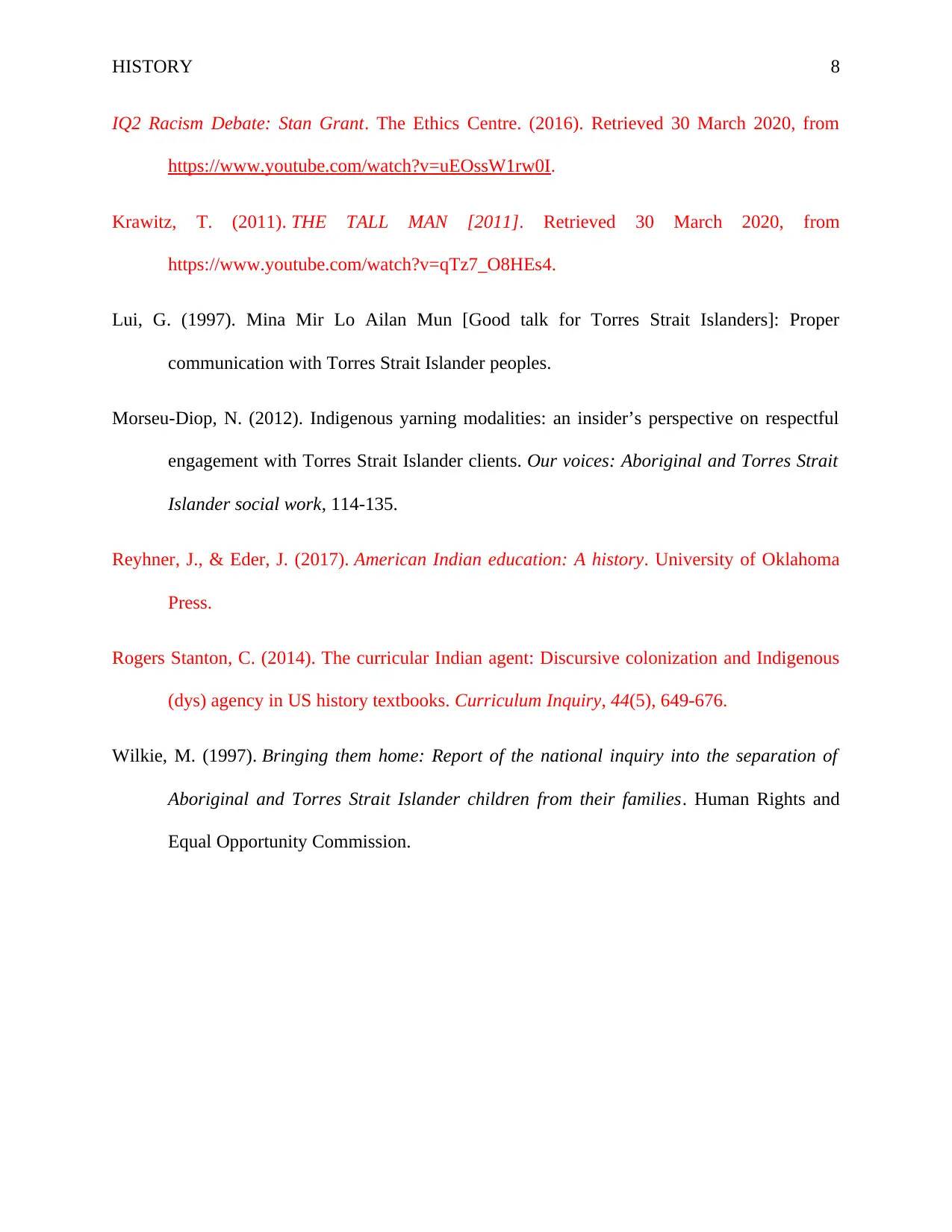
HISTORY 8
IQ2 Racism Debate: Stan Grant. The Ethics Centre. (2016). Retrieved 30 March 2020, from
https://www.youtube.com/watch?v=uEOssW1rw0I.
Krawitz, T. (2011). THE TALL MAN [2011]. Retrieved 30 March 2020, from
https://www.youtube.com/watch?v=qTz7_O8HEs4.
Lui, G. (1997). Mina Mir Lo Ailan Mun [Good talk for Torres Strait Islanders]: Proper
communication with Torres Strait Islander peoples.
Morseu-Diop, N. (2012). Indigenous yarning modalities: an insider’s perspective on respectful
engagement with Torres Strait Islander clients. Our voices: Aboriginal and Torres Strait
Islander social work, 114-135.
Reyhner, J., & Eder, J. (2017). American Indian education: A history. University of Oklahoma
Press.
Rogers Stanton, C. (2014). The curricular Indian agent: Discursive colonization and Indigenous
(dys) agency in US history textbooks. Curriculum Inquiry, 44(5), 649-676.
Wilkie, M. (1997). Bringing them home: Report of the national inquiry into the separation of
Aboriginal and Torres Strait Islander children from their families. Human Rights and
Equal Opportunity Commission.
IQ2 Racism Debate: Stan Grant. The Ethics Centre. (2016). Retrieved 30 March 2020, from
https://www.youtube.com/watch?v=uEOssW1rw0I.
Krawitz, T. (2011). THE TALL MAN [2011]. Retrieved 30 March 2020, from
https://www.youtube.com/watch?v=qTz7_O8HEs4.
Lui, G. (1997). Mina Mir Lo Ailan Mun [Good talk for Torres Strait Islanders]: Proper
communication with Torres Strait Islander peoples.
Morseu-Diop, N. (2012). Indigenous yarning modalities: an insider’s perspective on respectful
engagement with Torres Strait Islander clients. Our voices: Aboriginal and Torres Strait
Islander social work, 114-135.
Reyhner, J., & Eder, J. (2017). American Indian education: A history. University of Oklahoma
Press.
Rogers Stanton, C. (2014). The curricular Indian agent: Discursive colonization and Indigenous
(dys) agency in US history textbooks. Curriculum Inquiry, 44(5), 649-676.
Wilkie, M. (1997). Bringing them home: Report of the national inquiry into the separation of
Aboriginal and Torres Strait Islander children from their families. Human Rights and
Equal Opportunity Commission.
⊘ This is a preview!⊘
Do you want full access?
Subscribe today to unlock all pages.

Trusted by 1+ million students worldwide
1 out of 9
Related Documents
Your All-in-One AI-Powered Toolkit for Academic Success.
+13062052269
info@desklib.com
Available 24*7 on WhatsApp / Email
![[object Object]](/_next/static/media/star-bottom.7253800d.svg)
Unlock your academic potential
Copyright © 2020–2026 A2Z Services. All Rights Reserved. Developed and managed by ZUCOL.





